com-, co-, cog-, col-, con-, cor-
(Latin: together, together with, with)
The prefix com- is assimilated to co- before h, w, and all vowels:
The prefix com- becomes, cog- before g: cognition, [co + gnoscere, "to know"], et al.
The prefix com- becomes, col- before l: colloquial, et al.
The prefix com- becomes, con- before c, d, g, j, n, q, s, t, v: covivant, et al.
The prefix com- becomes, cor- before r: corrigible, et al.
The words for this unit show cartoons for all of the examples of the com-, co-, cog-, col-, con-, cor- entries; however, there are many more of them which exist in other units which are available when you type in a particular word in the search box at the bottom of this page.
The goldsmith was absconding with all the gold that belonged to the customers, however he was finally caught with a bag of stolen rings and necklaces.
Yesterday afternoon, a thief absconded with the neighbor's money and jewels.
2. Etymology: from Middle French abscondre and directly from Latin abscondere, "to hide, to conceal, to put out of sight"; from ab(s)-, "away" + condere, "to put together, to store", from com-, "together" + dere, "to put".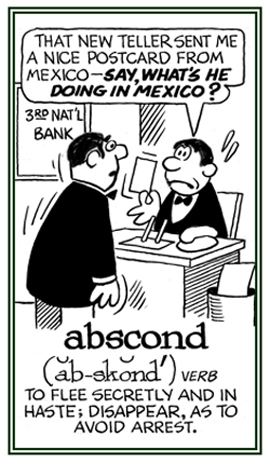
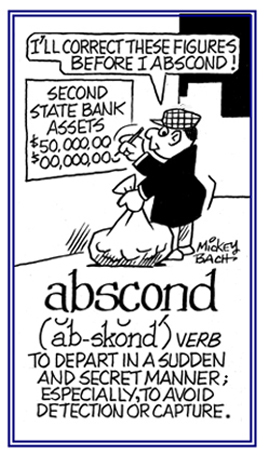

Go to this Word A Day Revisited Index
so you can see more of Mickey Bach's cartoons.
2. An organization of people or countries that are involved in a pact or treaty; an alliance: The two nations agreed on peace and formed a coalition to strengthen their policies.
3. A combination into one body; a union: The two parties formed a coalition to govern the country.
4. The state of being combined into one body: The coalition of different animal protection groups has an important part in the politics of the country.
5. The union of diverse things into one body, form, or group; the growing together of parts: Many teachers, businessmen, doctors, and parents formed a coalition because they all had the same objectives to help develop a youth club for the children in their city.
6. Etymology: borrowed from Latin coalescere, "to grow together"; from co-, "together" + alescere, "to grow up".
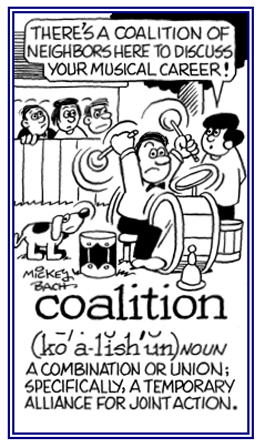
Go to this Word A Day Revisited Index
so you can see more of Mickey Bach's cartoons.
2. To dominate, restrain, or control forcibly by physical, moral or intellectual means: It is sad that some parents coerce their children by punishing them severely when they accidentally do something wrong.
3. Etymology: from about 1451, from Middle French cohercer, from Latin coercere "to control, to restrain"; from com-, "together" plus arcere, "to enclose, to confine, to contain, to ward off".
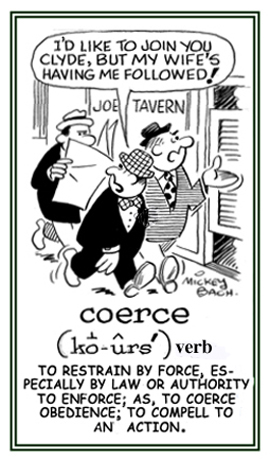
Go to this Word A Day Revisited Index
so you can see more of Mickey Bach's cartoons.
2. A reference to using force or threats to make someone do something against his or her will: Greg was very coercive towards his sister, making her keep his secret of stealing money from the principal’s office, otherwise he would hide her cell phone.
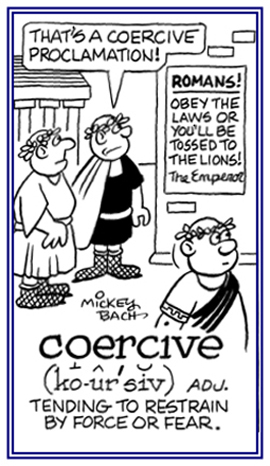
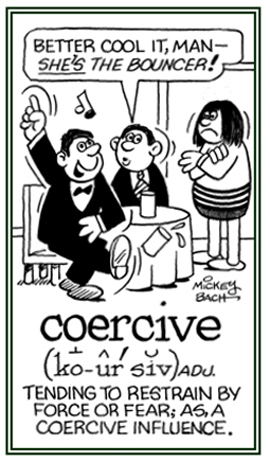
Go to this Word A Day Revisited Index
so you can see more of Mickey Bach's cartoons.
2. Etymology: from French cogent, "necessary, urgent" (14 century); from Latin cogentem , from cogere, "to curdle, to compel, to collect"; from com-, "together" + agere, "to drive".
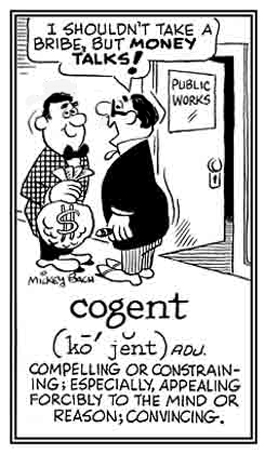



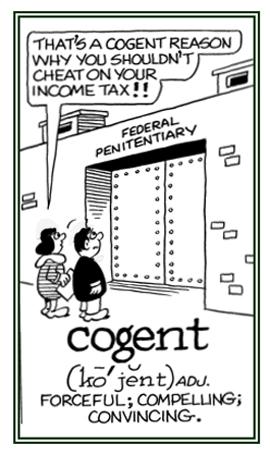
Go to this Word A Day Revisited Index
for a list of additional Mickey Bach illustrations.
2. To consider seriously; to reflect upon; to turn over in one's mind: When the election for President of the U.S. takes place, voters will be cogitating about which candidate will be the best one for the country.
3. Etymology: from Latin cogitatus, past participle of cogitare, "to ponder, to weigh, to reflect, to think", from co-, short for com-, "with, together" + agitare, "to put in constant motion, to drive, to impel"; from agere, "to set in motion, to drive, to lead".
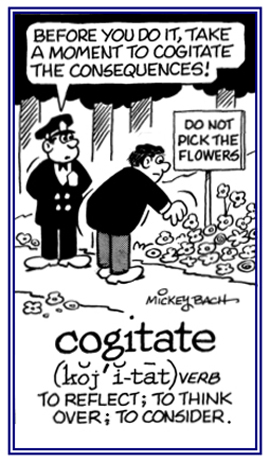

Go to this Word A Day Revisited Index
so you can see more of Mickey Bach's cartoons.
2. A careful and serious mental reflection about something: David applied all of his cogitation and energy, contemplating what topic he should take for the next term paper in his science class at school.

Go to this Word A Day Revisited Index
so you can see more of Mickey Bach's cartoons.
2. The range of what one can know or understand: Harriet's cognizance and perception of the nature of the species of the bird was quite amazing!
3. Observance; notice: The administrator will take cognizance of Jill's objections at the proper time.
4. In law, acknowledgment, recognition, or jurisdiction; the assumption of jurisdiction in a case: The court, being within cognizance, was able to act upon the case of murder without needing any further proof.
5. In heraldry, a crest or badge worn to distinguish the bearer: The knight was honored with a cognizance because of his bravery in battle.
6. Etymology: from Anglo-French conysance, "recognition"; later, "knowledge" from Old French conoissance, "acquaintance, recognition; knowledge, wisdom" (Modern French connaissance), from conoistre, "to know"; from Latin cognoscere, "to get to know, to recognize"; from com-, "together" + gnoscere, "to know".
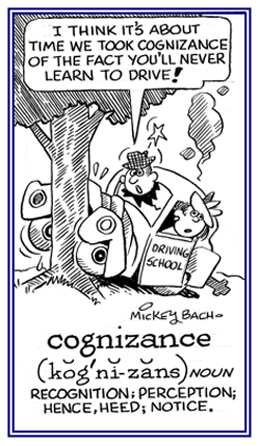
Go to this Word A Day Revisited Index
so you can see more of Mickey Bach's cartoons.
James is cognizant of his responsibilities as the father of his two boys.


Go to this Word A Day Revisited Index
so you can see more of Mickey Bach's cartoons.
2. Any name; especially, a nickname: "Mike" is the cognomen for Michael.
3. The third and commonly the last name of a citizen of ancient Rome, indicating the person's house or family, as "Caesar" in "Gaius Julius Caesar" or "Cicero" in "Marcus Tullius Cicero".
The ancient Roman name, Publius Cornelius Scipio, presents "Scipio" as his cognomen.
The full name of the poet Virgil was Publius Vergilius Maro and Maro designates or specifies his cognomen.
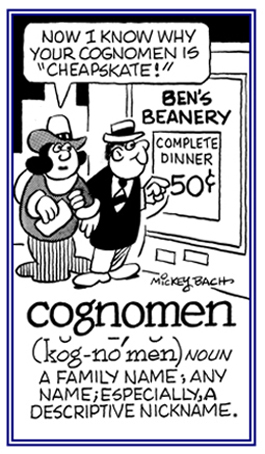
Go to this Word A Day Revisited Index
so you can see more of Mickey Bach's cartoons.
If people want to maintain their cohesion, then they must not let minor differences of opinions interfere with their major objectives.
A written story whose facts all make sense and fit together has cohesion.
2. Particles of the same substance sticking together: Cake batter usually has cohesion because all of the ingredients are mixed together and cannot be separated again!.Tar as a substance has cohesion and so does glue.
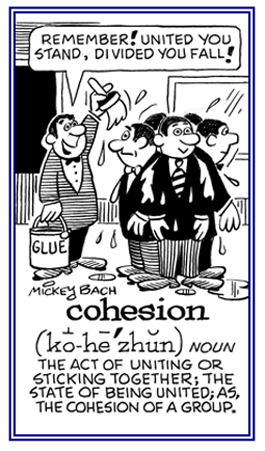
Go to this Word A Day Revisited Index
so you can see more of Mickey Bach's cartoons.
A cohort of three soldiers were wandering the countryside, hoping to find a place to sleep and food to eat.
2. Any group of associates: The Board of Directors for the company consisted of three cohorts who were employees; as well as, three cohorts who were elected to the Board.Last week, the police arrested the local criminal leader of a gang and his cohorts.
3. Companions or followers: The dynamic priest had a cohort of believers who shared his enthusiasm for moral living and the worship of God.4. A group of people sharing a common factor; such as, the same age or the same income bracket; especially, in a statistical survey: A lack of focus was a common failure for students in a particular age cohort.
5. A disapproving reference to a supporter, an accomplice, or an associate of a leader; especially, someone to whom special treatment and preference is given: The police were observing the gang's leader and his cohorts or fellow criminals.
6. Etymology: from Latin cohortem, accusative form of cohors, "enclosure"; with the extended meaning applied to "infantry company" in the Roman army (a tenth part of a legion, 400 to 600 men) by way of the notion of an "enclosed group, a retinue"; from com-, "with" + hortus. "garden".
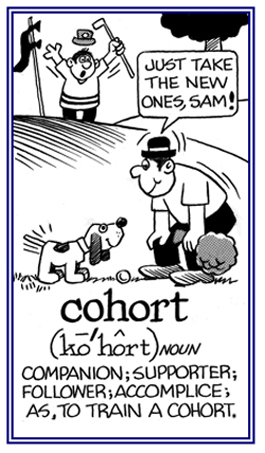
Go to this Word A Day Revisited Index
so you can see more of Mickey Bach's cartoons.
2. To work together, especially in a joint intellectual effort: The two writers decided to collaborate on a novel which was finally completed and published.
3. To cooperate jointly on an activity; primarily, to produce a mutual project: The people working on the special dictionary certainly have been able to collaborate nicely in order to achieve its completion!


Go to this Word A Day Revisited Index
so you can see more of Mickey Bach's cartoons.
2. A relative descended from the same ancestor as another person but through a different set of parents, grandparents, and other earlier relatives: The inheritance went to Marilyn, the only survivor of the family who was an old lady. The collaterals were all very distant relatives and not directly akin to each other.
3. Etymology: from medieval Latin collateralis, literally "side by side with", from Latin lateralis, "on the side".

Go to this Word A Day Revisited Index
so you can see more of Mickey Bach's cartoons.
Colleagues are those who are explicitly united in a common purpose and who respect each other's abilities to work together to achieve their objectives.



